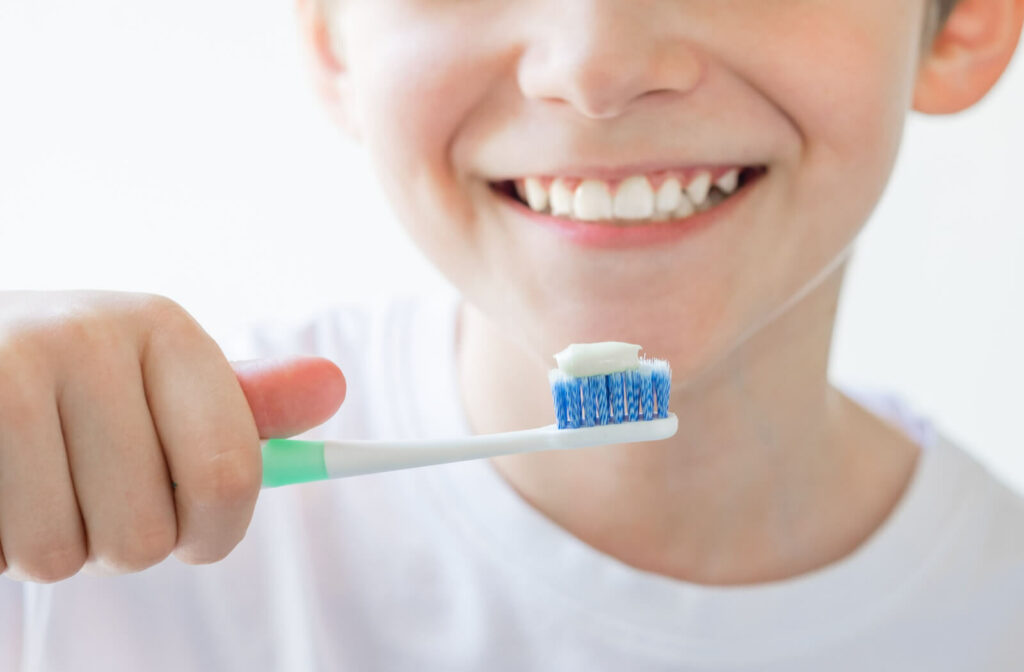Fluoride is found in our drinking water, oral health products, and treatments at the dentist. Fluoride does not whiten teeth, though, as it is not a whitening agent in itself.
However, fluoride can help prevent tooth decay and cavities. Let’s dive into what fluoride is and how it can benefit your teeth.
What Is Fluoride?
Fluoride is an essential mineral that plays a crucial role in maintaining healthy bones and teeth. It can be found naturally in various sources such as water, soil, plants, rocks, and air. In fact, most of the fluoride that we consume comes from drinking water.
Dentists often use fluoride to help strengthen the enamel, which is the outer layer of the teeth. This is because fluoride has the ability to penetrate the enamel and make it more resistant to acid attacks that can cause cavities. In addition, fluoride can also help reverse early signs of tooth decay.
Fluoride is a safe and effective way to prevent tooth decay and maintain good oral health when used appropriately. It is always a good idea to consult your dentist about the best ways to incorporate fluoride into your oral care routine.
Does Fluoride Help with Yellow Teeth?
Fluoride is an essential element in maintaining good dental health. It’s not a tooth-whitening agent, but it can help strengthen enamel and prevent tooth decay, which can contribute to a brighter smile.
While it may not have a bleaching effect on its own, fluoride is often combined with other whitening agents in certain types of toothpaste and dental treatments to provide a dual benefit of preventing tooth decay while whitening.
Can Yellow Teeth Become White Again?
Over time, changes in the colour of your teeth may be subtle and happen gradually. It’s natural for teeth to look more yellow or darken, especially as you age. This is because the outer enamel layer of your teeth wears away, making the yellow-tinted dentin layer underneath more visible.
However, there are ways to prevent or reduce teeth discolouration. Maintaining good oral hygiene, such as brushing and flossing regularly, can help remove surface stains and prevent plaque buildup. Avoiding foods and beverages that can stain your teeth, like coffee, tea, and red wine, can also help.
If you’re looking to brighten your smile, several options are available. Professional teeth whitening treatments can be done at a dentist’s office or with at-home kits. Some whitening toothpaste and mouthwashes may also help remove surface stains and improve the appearance of your teeth.
Remember, healthy teeth are not always perfectly white. If you notice any sudden changes in the colour of your teeth or have concerns about your oral health, it’s important to consult your dentist.
What Are the Disadvantages of Fluoride on Teeth?
Fluoride protects teeth from decay by demineralization and remineralization. However, too much fluoride can lead to dental or skeletal fluorosis, damaging bones and joints.
Dental fluorosis occurs when too much fluoride has been consumed while your teeth are still forming under your gums. This results in white spots on the surface of your teeth. Other than the appearance of white spots, dental fluorosis doesn’t cause any symptoms or harm.
Excess fluoride exposure can lead to a bone disease known as skeletal fluorosis. Over many years, this can result in damage to bones and joints.
The bones may become hardened and less elastic, increasing the risk of fractures. If the bones thicken and bone tissue accumulates, this can contribute to impaired joint mobility.
Is Fluoride Worth It for Adults?
Fluoride is beneficial for adults as well. It can be particularly helpful if you experience dry mouth, a common side effect of certain medical conditions and medications.
Dry mouth reduces saliva production and increases the risk of oral health issues like gum disease and cavities. Additional fluoride may be beneficial if you have a history of tooth decay or gum disease.
Additionally, suppose you have dental work such as crowns, bridges, braces, or removable partial dentures. In that case, you may have a higher risk of developing cavities, particularly around orthodontic brackets or where your crown meets your tooth.
What Happens During a Fluoride Treatment
Fluoride treatments are offered by dentists in various forms, such as rinse, foam, gel, or varnish, which are highly concentrated. The treatment can be applied using a swab, brush, tray, or mouthwash, and it only takes a few minutes to complete.
These treatments contain a higher amount of fluoride than what is present in your toothpaste or water. After the treatment, it is recommended to avoid eating or drinking for at least half an hour to allow for maximum absorption of fluoride.
Teeth Whitening & Fluoride Treatments in Surrey
Ultimately, it is up to you to decide whether or not you think fluoride is the right option for you. Discuss fluoride treatments with your dentist, and provide your medical history. From there, you and your dentist can come up with a personalized oral health plan.At Newton Smiles Dental, our team is here to answer questions and can work with you to create a whitening solution or fluoride treatment based on your needs. Contact us today to get started.


